ICAC’s pursuit of ex-Renewal SA boss John Hanlon ‘reasonable, appropriate’, review finds
ICAC’s pursuit of ex-Renewal SA boss John Hanlon was reasonable and appropriate but led to ‘maladminstration’, a review has found.
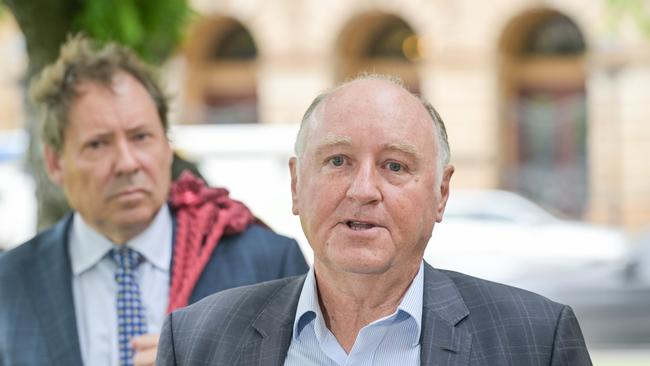
Police & Courts
Don't miss out on the headlines from Police & Courts. Followed categories will be added to My News.
Institutional failures within the state’s anti-corruption watchdog led to “maladministration” and “substantial mismanagement” when investigating former Renewal SA boss John Hanlon, a review has concluded.
A report tabled in parliament on Tuesday has found ICAC breached international law and German sovereignty pursuing Mr Hanlon over alleged spending of taxpayer funds.
It also found the watchdog’s failure to disclose evidence, obtained in Germany, that was consistent with Mr Hanlon’s claims of innocent was “serious”.
In his long-awaited report, ICAC Inspector Phillip Strickland KC criticised the “reckless attitude” of investigators.
“I consider that conducting of investigations in Germany without lawful authority, and without making proper inquiries in advance of the trip to Germany was evidence of maladministration in public administration,” he said.
“I also consider there was impropriety not in the sense of dishonest conduct but in the failure to observe accepted standards of conduct by those with responsibility for investigating corruption.
“This conduct is also capable of giving rise to findings of incompetence or negligence.
“I do not make those findings against individual officers – this was an institutional failure that cannot be attributed to any one person.”
The failure to disclose evidence, he said, was also “evidence of maladministration in public administration by ICAC”.
“Specifically, the failure to disclose is evidence of substantial mismanagement in relation to ICAC’s performance of its official functions,” he said.
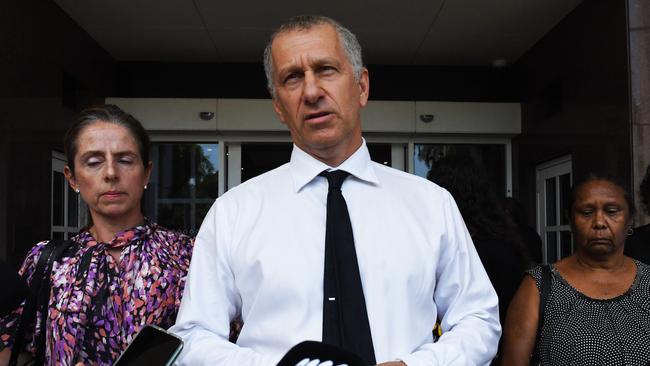
However, Mr Strickland also found it was “reasonable and appropriate” to investigate Mr Hanlon despite the “number of significant errors” made.
He said it was not his role to “examine whether Mr Hanlon was guilty of corrupt or criminal conduct”, nor to make findings of guilt or innocence.
He said it was also not his role to determine whether or not prosecutors should or should not have charged him with allegedly spending taxpayer money on personal holidays.
“While my review has identified a number of significant errors in ICAC’s conduct during the course of the investigation into Mr Hanlon, I have found that the investigation of Mr Hanlon and the referral of that investigation to the DPP were reasonable and appropriate,” he said.
“Based on the evidence available to the ICAC investigators, the investigation and referral were important in order to detect, prevent and minimise corruption in public administration.
“I do not find that the evidence established that there was a pervasive culture of inappropriately pursuing prosecutions within ICAC.
“Nor do I accept that ICAC investigators approached the investigation into Mr Hanlon with a bias or a predetermination of guilt.”
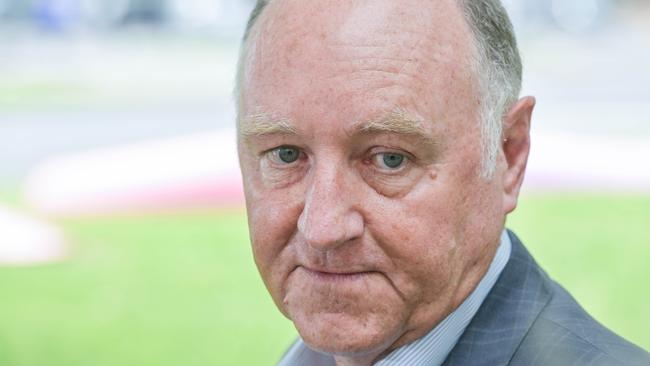
In June 2021, the Adelaide Magistrates Court threw out allegations Mr Hanlon had spent $15,000 of taxpayers funds on personal interstate and overseas trips.
Prosecutors relaid the charges in the District Court but, in November 2022, dropped them on the first day of trial amid revelations about ICAC’s investigation.
During pre-trial argument, two ICAC investigators conceded under oath they had failed to comply with international law by interviewing German witnesses without that government’s permission.
They further conceded they had been told of their mistake, by Australia’s consulate general to Berlin, but neither corrected it nor disclosed it to prosecution or defence counsel.
The court also heard ICAC had been in possession of evidence supporting Mr Hanlon’s claims of innocence since August 2019, but had never disclosed it.
Court documents, meanwhile, revealed ICAC investigators Andrew Baker and Amanda Bridge took a taxpayer-funded “weekend off” in Hamburg while pursuing the case.
Commissioner Ann Vanstone announced a review of the case – which predated her appointment to the role – would be conducted by Mr Strickland.
His inquiry was to examine not only the actions of ICAC investigators but also the role prosecutors played in the carriage of the matter through the courts system.
Meanwhile Mr Hanlon, who denied the allegations throughout his prosecution, was reimbursed $450,000 spent on legal fees.
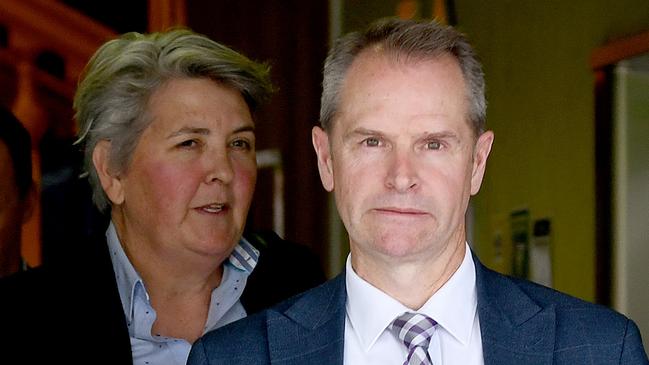
In his report, Mr Strickland said the investigation into Mr Hanlon began in 2018 following reports from two Renewal SA employees “regarding bullying and harassment within the organisation”.
Subsequently, then Attorney-General Vickie Chapman “received an anonymous letter” alleging the taking of trips via the improper use of public funds.
The first of those trips was to Melbourne, alongside fellow Renewal SA employee Georgina Vasilevski – against whom charges were also dismissed, and reimbursement paid.
Mr Strickland said then-Commissioner Bruce Lander made an “appropriate and lawful” decision to investigate the Melbourne trip.
The use of listening and surveillance devices, he said, “did not involve any unreasonable invasion of privacy”.
At one stage, he said, those devices captured Mr Hanlon and Ms Vasilevski discussing their travel, and Mr Hanlon saying the words: “Never, never admit to a thing.”
He said that, in another recording, Mr Hanlon discussed the ICAC investigation with an employee.
“(I’m) just pissed off with it all, that’s all, because I think it’s not going to end well … yeah I personally think they’ll probably get me,” he says.
Asked why, he replies: “I don’t know, you can’t just get out of these things once they start.”
Mr Strickland said Mr Lander and Ms Bridge came “to suspect” Mr Hanlon “influenced others to commit offences” and “falsify and backdate records”.
The recordings, he said, led ICAC to believe Mr Hanlon “was willing to undertake private travel” to Melbourne “and claim it as work travel”.
He said they came to believe “documents were being doctored to support a false account” that his trips “had a legitimate business purpose”.
He noted Mr Hanlon’s belief the allegations were made by a “disgruntled” employee but said, even if that were true, “that would not of itself undermine the legitimacy of the allegations being made”.
“I do not find that the complaints were motivated by some ulterior purpose or that they were not genuinely made,” he said.
“There was sufficient evidence to support the continuation of the ICAC investigation.”
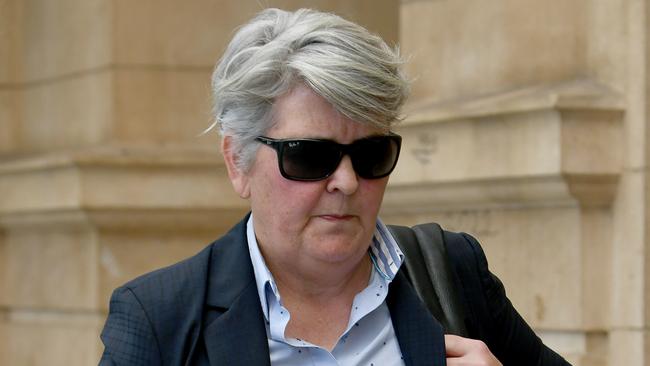
With regard to Mr Hanlon’s German trip, Mr Strickland said ICAC’s decision to investigate was also “reasonable and appropriate”.
He noted Mr Baker had drafted a memo saying that, due to political and media attention on the issue, “it is important” the investigation “results in a successful prosecution”.
Mr Strickland was critical in his report of “the language used” in that memo and “a number of” ICAC documents, but said it did not mean the watchdog prejudged suspects.
Nor, he said, did it “amount to evidence of misconduct or maladministration in public administration”.
“The language used compromises the impartiality of investigators … at the very least, it creates the appearance of bias or partiality,” he said.
“There was a reasonable basis for ICAC investigators to request that inquiries be conducted on the ground in Germany and for Mr Lander to approve that request.
“This is a different question to whether those inquiries were properly carried out.”
According to the report, he said the manner in which Mr Baker and Ms Bridge conducted themselves overseas was “quite extraordinary” given they “had no authority to undertake any official activities in Germany at that time”.
This was worsened, he said, by “tension” within ICAC, and confusion about, the role to be played and level of oversight had by the watchdog’s legal advisers over investigations.
Mr Lander and ICAC should have, he concluded, sought legal advice “about the lawfulness” of Mr Baker and Ms Bridge’s actions in Germany before their departure.
Mr Strickland was critical in his report of both investigators, saying their evidence before him was “at times self-serving”.
“Although I do not consider that either of them were deliberately dishonest, both had a tendency to minimise their role in events, shift responsibility and recreate events from the past in a favourable light to themselves,” he said.
Ms Bridge had, he said, displayed “a reckless attitude to the carrying out of her official functions” while overseas.
She had also not saved many of the emails regarding the investigation, he said, demonstrating “a lack of attention and regard” but not “deliberate” action.
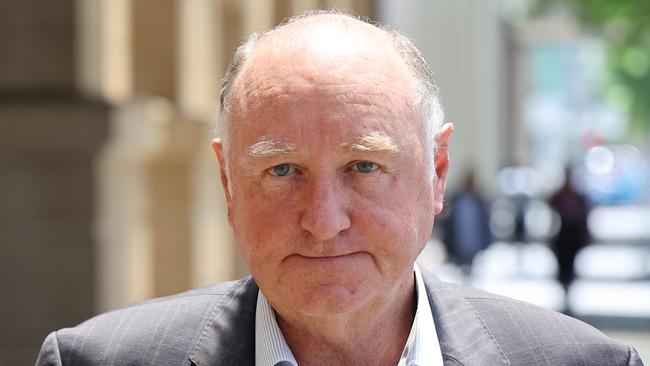
There was, he said, “no excuse” for the duo’s failure to consult with either the Australian Embassy or Australian Federal Police about proper overseas investigation protocols.
“There is no satisfactory explanation as to why these elementary steps did not occur to Ms Bridge or Mr Baker,” he said.
“It was highly regrettable that neither any ICAC legal officer nor Mr Lander turned their mind to the fundamental issue of whether the ICAC investigators had the lawful authority to carry out official functions in Germany without the knowledge and permission of the German authorities.”
He found that amounted to “maladministration in public administration” – but on an institutional level within ICAC, not against the investigators individually.
He found it also breached German law and sovereignty, which could “cause significant damage to the reputation and the integrity of ICAC”.
Despite those issues, Mr Strickland said referring the case to prosecutors was appropriate and that the case was not infected by “undue delay”.
However, he said ICAC’s failure to disclose evidence consistent with Mr Hanlon’s claims of innocence was “serious” and should not have occurred.
“I find that the failure to disclose these matters is evidence of maladministration in public administration by ICAC,” he said.
“Specifically, the failure to disclose is evidence of substantial mismanagement in relation to ICAC’s performance of its official functions.
“The failure to disclose was an institutional failure on the part of ICAC.”
Despite those issues, Mr Strickland concluded the decisions to investigate Mr Hanlon, to refer the case to prosecutors, and to take him to trial, were all reasonable and appropriate.
Because of that, he said, Mr Hanlon suffered no “undue prejudice” to his reputation.
He said ICAC had amended its internal policies about disclosure, email storage, international investigation and the oversight of legal officers since the end of Mr Hanlon’s case.
“I do not find that this conduct was deliberate – rather, it is evidence of substantial mismanagement in relation to ICAC’s official functions resulting from incompetence or negligence,” he said.
“I find that the maladministration in public administration was at an institutional level and cannot be attributed to any one officer.
“I do not find that the conduct of any ICAC officer warrants referral to SAPOL or another law enforcement agency for further investigation or prosecution.
“I have also had regard to the measures ICAC has now put in place to prevent such deficiencies from happening in the future.
“I consider those measures are appropriate and reasonable.”



